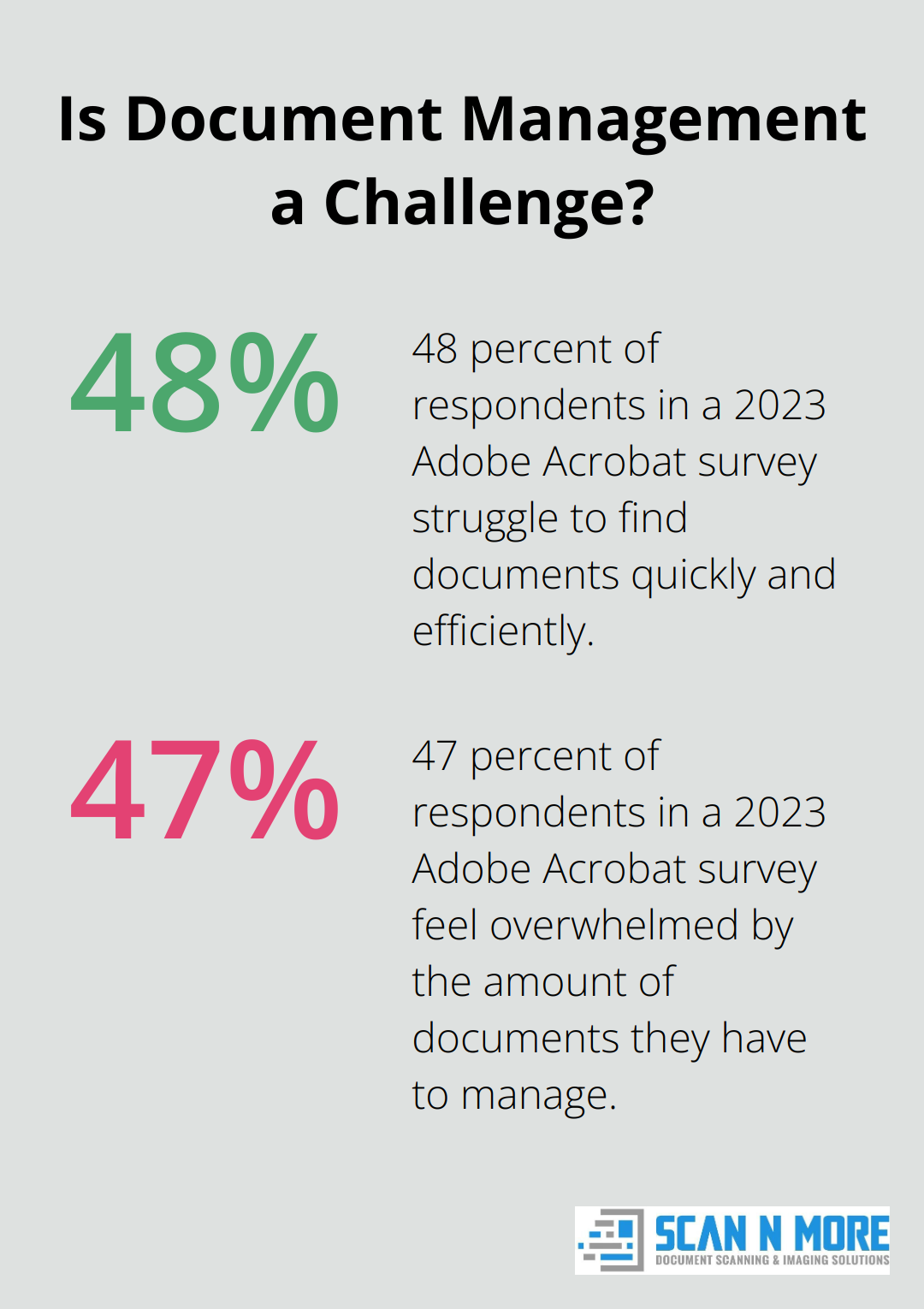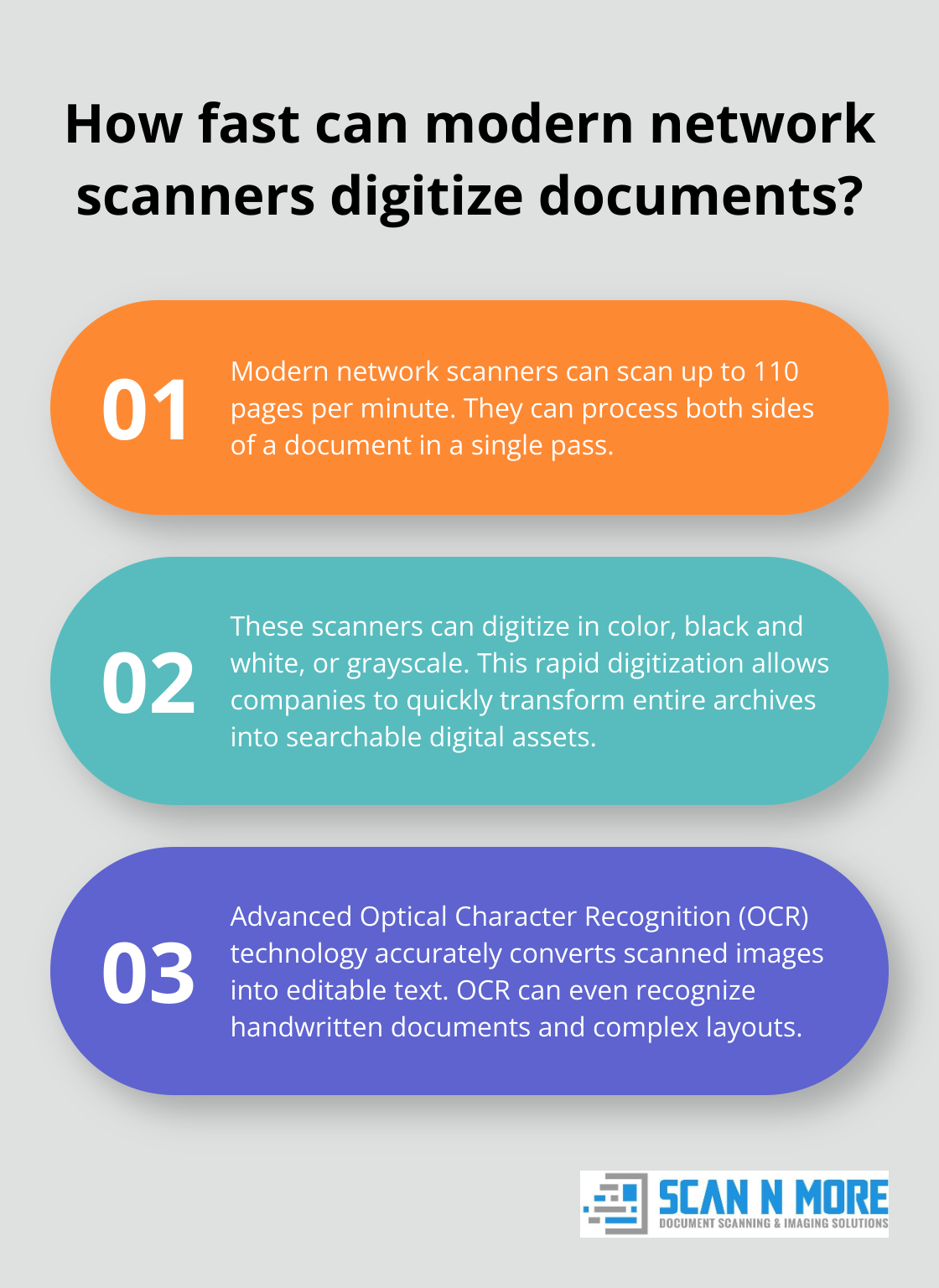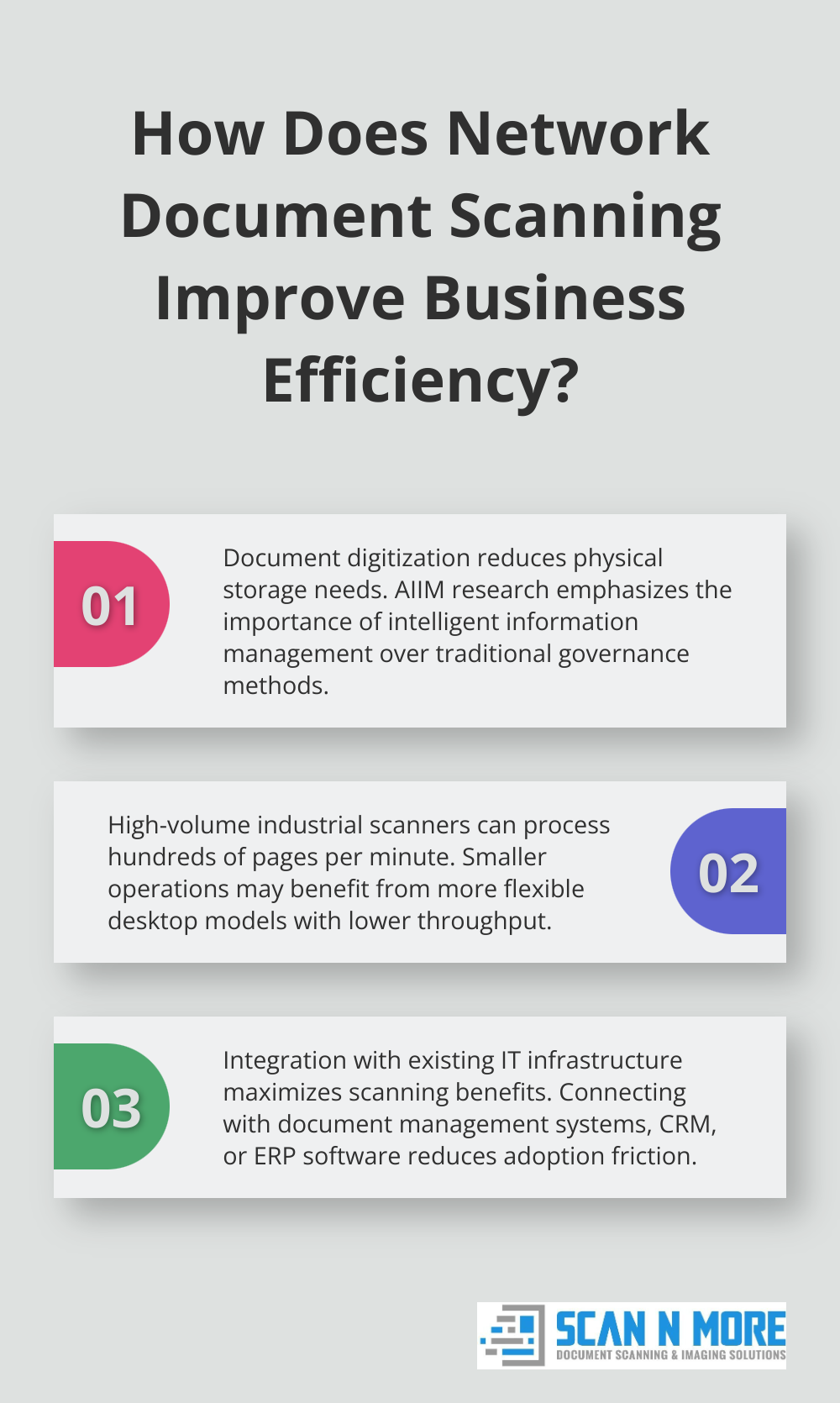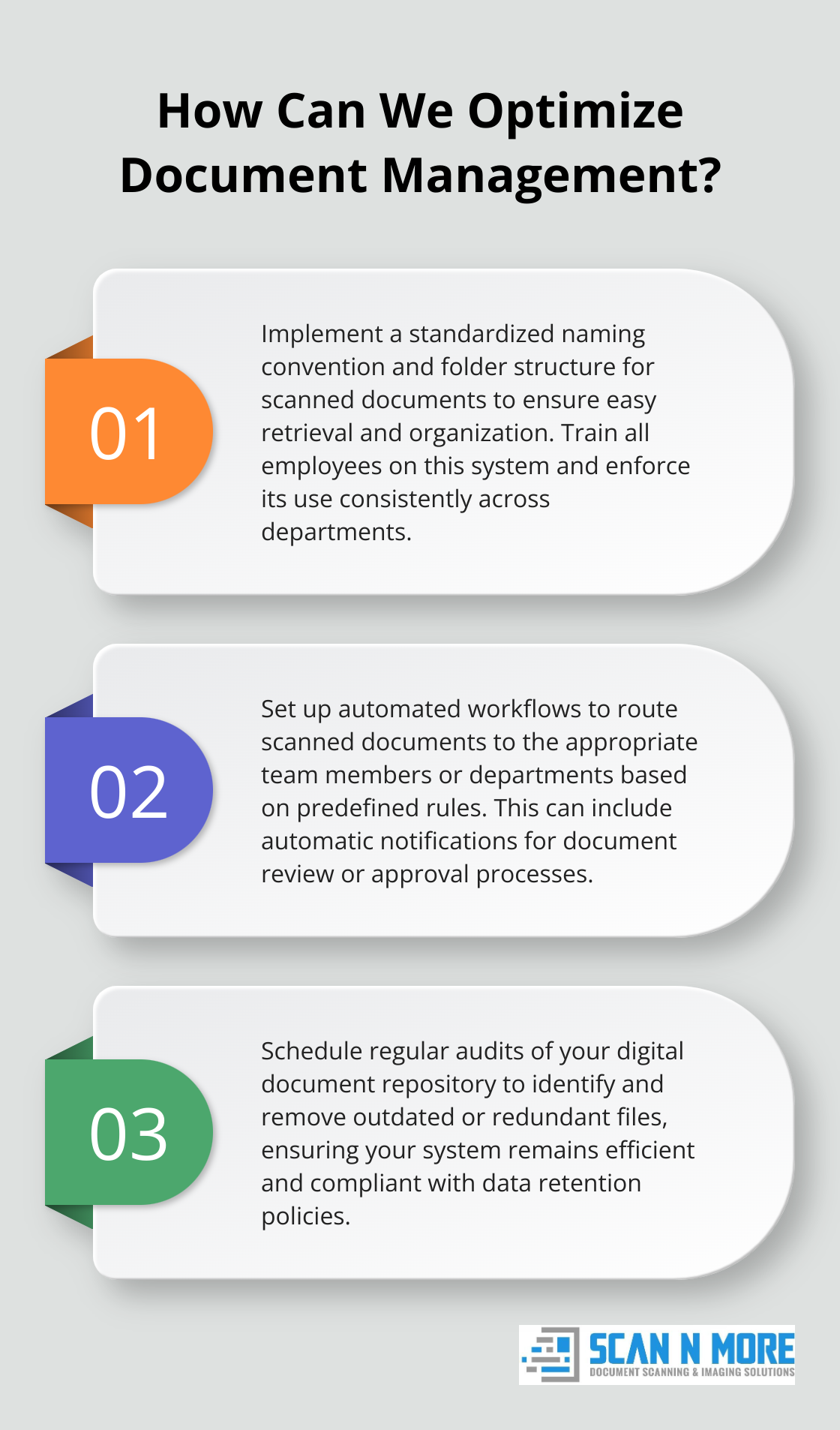Network document scanning is revolutionizing the way organizations handle their paperwork. At Scan N More, we’ve seen firsthand how this technology transforms workflows and boosts productivity.
By digitizing physical documents and making them instantly accessible across networks, businesses can streamline operations and enhance collaboration. This blog post explores the key features and benefits of network document scanning, offering practical insights on implementation for your organization.
Why Network Document Scanning Matters
Revolutionizing Operational Efficiency
Network document scanning transforms how organizations handle, store, and access information. This technology eliminates manual paperwork, which saves time previously spent on filing, retrieving, and managing physical documents. In a 2023 Adobe Acrobat survey, 48 percent of respondents said they struggle to find documents quickly and efficiently, while 47 percent feel overwhelmed by the amount of documents they have to manage. Network scanning reclaims this time for more productive tasks.
Fostering Seamless Collaboration
Network scanning enables instant sharing of digitized documents across departments and locations. This real-time access promotes better collaboration and faster decision-making. Teams no longer wait for physical documents to travel between offices. This boost in efficiency (particularly for geographically dispersed teams) highlights the value of network document scanning in today’s global business landscape.
Strengthening Document Security
Network document scanning plays a pivotal role in enhancing document security. Digital documents allow for encryption, password protection, and tracking, which provides a clear audit trail. Robust security measures, including encryption, access controls, and audit trails, are critical for protecting sensitive information. This level of security proves essential for industries that handle sensitive information.
Ensuring Regulatory Compliance
Many industries face strict regulatory requirements for document management and retention. Network document scanning simplifies compliance with these regulations. Digital documents allow for easy implementation of retention policies, quick retrieval for audits, and secure destruction when necessary. This streamlined approach to compliance (which reduces the risk of costly fines and legal issues) makes network scanning an invaluable tool for businesses in regulated industries.
Facilitating Business Continuity
Natural disasters, office relocations, or unexpected events can disrupt business operations. Network document scanning provides a safeguard against these disruptions. With digitized documents stored securely in the cloud or on remote servers, businesses ensure continuous access to critical information. This resilience allows companies to maintain operations even in challenging circumstances, minimizing downtime and potential revenue loss.

As we explore the key features of network document scanning in the next section, you’ll discover how this technology addresses these critical business needs and propels organizations into a more efficient, secure, and collaborative future.
What Makes Network Document Scanning Powerful?
Network document scanning has transformed how businesses handle information. This technology combines speed, accuracy, and accessibility to create a seamless document management experience. Let’s explore the key elements that make network document scanning an indispensable tool for modern organizations.
Lightning-Fast Digitization
Speed is essential in today’s fast-paced business environment. Modern network scanners can scan up to 110 pages-per-minute, which reduces the time spent on document conversion. These scanners can process both sides of a document in a single pass and scan in color, black and white, or grayscale. This rapid digitization allows companies to quickly transform entire archives into searchable digital assets.
Intelligent Text Recognition
Advanced Optical Character Recognition (OCR) technology forms the backbone of effective network scanning. This sophisticated software accurately converts scanned images into editable and searchable text (even from handwritten documents or complex layouts).
Seamless Cloud Integration
Cloud integration revolutionizes network document scanning. It provides instant access to scanned documents from anywhere, on any device. This capability proves particularly valuable for remote teams or businesses with multiple locations. Cloud storage enhances collaborative dynamics within businesses, enabling more efficient cross-departmental work.
User-Centric Design
The most effective network scanning solutions prioritize user experience. Intuitive interfaces and customizable workflows ensure that employees can easily adapt to the new system without extensive training. This focus on usability is critical for widespread adoption and long-term success.

Network document scanning transcends the simple conversion of paper to pixels. It creates a more efficient, secure, and collaborative work environment. The next section will guide you through the implementation of these powerful features in your organization, ensuring you maximize the benefits of this transformative technology.
How to Implement Network Document Scanning
Assess Your Current Document Landscape
Conduct a thorough audit of your existing document management processes. Identify the types and volumes of documents you handle, current storage methods, and pain points in your workflow. This assessment will help you determine the scale of your scanning needs and prioritize which documents to digitize first.
AIIM research shows that mindsets and methodologies centered on risk, compliance, and governance for governance’s sake, only water the seeds of intelligent information management. This underscores the importance of a well-planned implementation strategy.
Select the Right Scanning Solution
Choose scanning hardware and software that aligns with your specific needs. Consider factors such as scanning speed, document volume, and required features like OCR or cloud integration. For high-volume needs, industrial-grade scanners capable of processing hundreds of pages per minute might be necessary. Smaller operations might opt for desktop models with lower throughput but more flexibility.
Develop a Robust Training Program
Employee buy-in is critical for successful implementation. Create a comprehensive training program that covers not only the technical aspects of using the new scanning system but also the benefits and best practices of digital document management.
Integrate with Existing Systems
Ensure your new scanning solution integrates seamlessly with your current IT infrastructure and business processes. This might involve connecting to your existing document management system, CRM, or ERP software. A well-integrated system reduces friction in adoption and maximizes the benefits of network document scanning.
Establish Clear Workflows and Policies
Create standardized procedures for document scanning, indexing, and storage. Define who is responsible for scanning different types of documents, how they should be named and categorized, and where they should be stored. Clear policies ensure consistency and make it easier for employees to adapt to the new system.

Final Thoughts
Network document scanning transforms business operations, enhancing efficiency, collaboration, and security. This technology offers comprehensive solutions to modern document management challenges through rapid digitization, intelligent text recognition, and seamless cloud integration. The long-term impact on productivity and cost savings proves substantial, with businesses reporting reduced processing times and significant reductions in storage costs.

The future of network document scanning technology promises continued advancements in AI and machine learning capabilities. These improvements will further enhance the accuracy and speed of document processing. As more businesses recognize the value of digital transformation, network document scanning will shape efficient, paperless workplaces.
Scan N More helps organizations harness the power of network document scanning. We offer professional services for high-quality scanning of all document formats (ensuring data security and compliance). Our fast, cost-effective solutions cater to various needs, including digitizing legal documents, implementing mail scanning services, and securely destroying hard drives.
